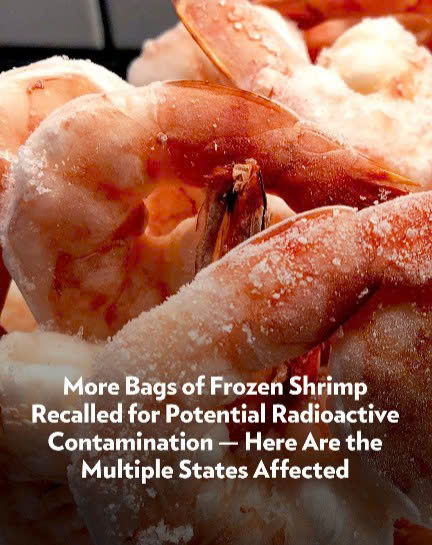The U.S. Food and Drug Administration (FDA) has expanded its recall of frozen shrimp products after new concerns about potential contamination with the radioactive isotope Cesium-137, just days after a similar recall was announced involving Walmart’s Great Value brand. On August 21, the FDA revealed that Southwind Foods of California had voluntarily recalled thirteen frozen shrimp items sold under multiple brand names including Sand Bar, Best Yet, Great American, Arctic Shores, and First Street.

According to the recall notice, these products, which were distributed between July 17 and August 8, may have been contaminated during the supply chain process, specifically linked to Indonesian supplier PT. Bahari Makmur Sejati (BMS Foods). The recalled shrimp products were shipped to retailers, wholesalers, and distributors across nine states: Alabama, Arizona, California, Massachusetts, Minnesota, Pennsylvania, Utah, Virginia, and Washington. Items under recall include both raw and cooked shrimp packaged in various bag sizes as well as prepared shrimp salads. The FDA also released images of the packaging to help consumers identify the affected products and urged them not to eat the shrimp but to dispose of them immediately. Cesium-137, often referred to as Cs-137, is a radioactive isotope that can pose significant health risks if ingested repeatedly over time. The Environmental Protection Agency describes Cs-137 as a silvery-white, soft metal that can become liquid near room temperature.
While traces of the isotope exist in the environment at low background levels, higher concentrations can enter food and water sources in areas with environmental contamination. The FDA emphasized that the primary health risk from long-term exposure to low doses of Cs-137 comes from an elevated likelihood of cancer caused by DNA damage in human cells. Importantly, the FDA noted that no illnesses have been reported in connection with the contaminated shrimp, but precautionary measures were necessary to protect consumers. This is not the first time in recent months that shrimp products have come under scrutiny. On August 19, just two days before the Southwind Foods recall, Walmart recalled three lots of its Great Value frozen raw shrimp after low levels of Cesium-137 were detected.
Those products carried the lot codes 8005540-1, 8005538-1, and 8005539-1, with a best-by date of March 15, 2027. They were sold in multiple states including Alabama, Arkansas, Florida, Georgia, Kentucky, Louisiana, Missouri, Mississippi, Ohio, Oklahoma, Pennsylvania, Texas, and West Virginia. Like the Southwind Foods recall, the Walmart recall was also tied to BMS Foods, which the FDA determined had violated the Federal Food, Drug, & Cosmetic Act by processing seafood in unsanitary conditions. BMS Foods has since been placed on an import alert for chemical contamination, which prevents any of its products from entering U.S. commerce until further notice.
The FDA explained that it is continuing its investigation into the source of the contamination, focusing both on shrimp products and the shipping containers used by the supplier. While the risk to consumers from single exposures is considered low, the potential long-term dangers made the recall necessary. Cesium-137 has a half-life of about 30 years, meaning it remains hazardous in the environment for decades, and even low-level contamination in food can be concerning if consumed regularly. Southwind Foods stated it is cooperating fully with the FDA and working to ensure that no additional contaminated shrimp products remain on store shelves. The FDA reassured consumers that it is working with all businesses in the U.S. that sell or distribute products from BMS Foods to identify and remove any contaminated shipments.
Food safety advocates have noted that shrimp is one of the most widely consumed types of seafood in the U.S., making strict oversight essential. In recent years, the seafood industry has seen several recalls for health risks ranging from listeria contamination to now radioactive isotopes. The FDA stressed that food safety remains its highest priority and that this recall reflects its ongoing commitment to protecting the public. For consumers, the guidance is clear: do not eat any shrimp products included in the recall. Instead, dispose of them safely and check packaging carefully against the lot numbers and brand names listed by the FDA.
For Walmart’s Great Value frozen raw shrimp, shoppers are urged to discard any bags matching the lot codes 8005540-1, 8005538-1, or 8005539-1 with a best-by date of March 15, 2027. For Southwind Foods products under Sand Bar, Best Yet, Great American, Arctic Shores, and First Street, consumers should compare packaging details with the images provided by the FDA recall notice. This latest incident underscores the importance of vigilance in monitoring global food supply chains and ensuring compliance with strict safety standards.
As the FDA continues its investigation, more updates may follow, and consumers are encouraged to remain cautious and stay informed through official announcements. Although no illnesses have been reported, the recall serves as a reminder of the potential risks that exist in imported foods and why strict oversight and timely recalls are crucial in preventing long-term health consequences for the public.





